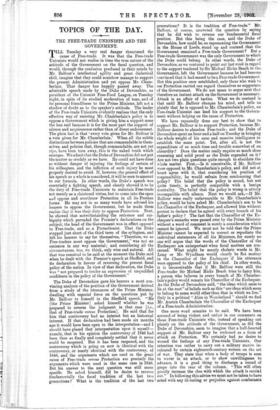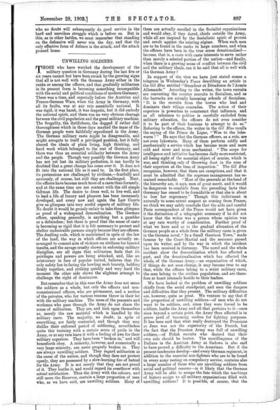TOPICS OF THE DAY.
THE FREE-TRADE UNIONISTS AND THE GOVERNMENT.
TILL Tuesday a very real danger threatened the cause of Free-trade. It was that the Free-trade Unionists would not realise in time the true nature of the attitude of the Government on the fiscal question, and would, through the confusion produced in their minds by Mr. Balfour's intellectual agility and great dialectical skill, imagine that they could somehow maua.ge to support the present Administration and yet oppose Mr. Cham- berlain. That danger has happily passed away. The admirable speech made by the Duke of Devonshire, as president of the Unionist Free-Food League, on Tuesday night, in spite of its studied moderation of tone, and of its personal friendliness to the Prime Minister, left not a shadow of doubt as to the speaker's attitude. The leader of the Free-trade Unionists evidently realises that the only effective way of resisting Mr. Chamberlain's policy is to oppose a Government which is giving him a support none the less real because it is for the most part the support of silence and acquiescence rather than of direct endorsement. The plain fact is that every vote given for Mr. Balfour is a vote given for Mr. Chamberlain.' When all the subtle distinctions between policies that are commendable in them- selves, and policies that, though commendable, are not yet ripe, have been torn away, this is the naked truth which emerges. We admit that the Duke of Devonshire did not put the matter so crudely as we have. He could not have done so without danger of injuring the feelings of certain of his _colleagues, and the infliction of such injury he most properly desired to avoid. If, however, the general effect of his speech as a whole is considered, it will be seen to amount to our formula. In other words, the Duke's speech was essentially a fighting speech, and clearly showed it to be the duty of Free-trade Unionists to maintain Free-trade not merely as a cloistered virtue, but to come into the open and oppose and overthrow Protection in all its Protean forms. He may not in so many words have advised his hearers to oppose the Government, but he made them realise that it was their duty to oppose Protection. Next, he showed that notwithstanding the reticence and am- biguity which pervaded the Premier's declarations on the subject, the head of the Government was in effect opposed to Free-trade, and so a Protectionist. That the Duke stopped just short of the third term of the syllogism, and left his hearers to say for themselves, "Therefore, we as Free-traders must oppose the Government," was not an omission in any way material ; and. considering all the circumstances, was, we think, only wise and natural. All that was essential to be said at the moment the Duke said when be dealt with the Premier's speech at Sheffield, and its declaration in favour of reversing the present fiscal policy of the nation. In view of that declaration, the Duke was "not prepared to tender an expression of unqualified confidence in the policy of the Government."
The Duke of Devonshire gave his hearers a most con- vincing analysis of the position of the Government derived from a study of the utterances of the Prime Minister, dwelling with especial force on the questions put by Mr. Balfour to himself in the Sheffield speech. "He [the Prime Minister] asked himself whether he was prepared to reverse the judgment in that case [i.e., that of Free-trade versus Protection]. He said that for him that controversy had no interest but an historical interest. If that declaration had been made six months ago it would have been open to the interpretation—and I should have placed that interpretation upon it myself— namely, that in his opinion the controversy of 1846 had been then so finally and completely settled that it never could be reopened. But it has been reopened, and the controversy which is going on now is identical with the controversy, or nearly identical with the controversy, of 1846, and the arguments which are used in the great cause of Free-trade versus Protection are precisely the arguments which were used in the same case in 1846. But his answer to the next question was still more specific. He asked himself, did he desire to reverse fundamentally the fiscal tradition of the last two generations ? What is the tradition of the last two generations? It is the tradition of Free-trade." Mr. Balfour, of course, answered the question by saying that he did wish to reverse our fundamental fiscal position. But this being the case, said the Duke of Devonshire, how could he, as representing the Government in the House of Lords, stand up and contend that the Government remained a Free-trade Government ? But a Free-trade Government was the only Government to which the Duke could belong. In other words, the Duke of Devonshire, as we ventured to point out last week in regard to the support tendered by Sir Michael Hicks Beach to the Government, left the Government because he had become convinced that it had ceased to be a Free-trade Government. But this position once established, only those who wish to see Protection carried can regard themselves as supporters of the Government. We do not mean to argue next that therefore an instant attack on the Government is necessary. Attack is an affair of tactics. What we do contend is that until Mr. Balfour changes his mind, and tells us plainly that he is opposed to Mr. Chamberlain's policy, no Free-trade Unionist can lend his support to the Govern- ment without helping on the cause of Protection.
We have repeatedly done our best to show that to support Mr. Balfour is to support Protection, because Mr. Balfour desires to abandon Free-trade ; and the Duke of Devonshire spent an hour and a half on Tuesday in bringing the whole weight of his sane and massive intelligence to establish the same point. Yet, after all, is not the expenditure of so much time and trouble somewhat of an absurdity ? Does the matter really require so much close reasoning and solid proof as the Duke expended on it? Are not two plain questions quite enough to elucidate the whole matter. First,—Is it conceivable, if Mr. Balfour were opposed to Mr. Chamberlain's policy, and did not at heart agree with it, that considering his position of responsibility, he would refrain from condemning that policy? The belief that the policy is sound, but not quite timely, is perfectly compatible with a benign neutrality. The belief that the policy is wrong is utterly incompatible with silence. Next we would ask,—If Mr. Balfour were really unfavourable to Mr. Chamberlain's policy, would he have asked Mr. Chamberlain's son to be his Chancellor of the Exchequer, and allowed him without protest to declare that he agreed with every branch of his father's policy ? The fact that the Chancellor of the Ex- chequer's remarks were passed over by the Prime Minister without a word of comment is surely a consideration which cannot be ignored. We must not be told that the Prime Minister cannot be expected to correct or repudiate the individual statements of all his Ministers, for surely no one will argue that the words of the Chancellor of the Exchequer are unimportant when fiscal matters are con- cerned. What might be merely choleric words in Mr. Long or Mr. Wyndham would clearly be flat mutiny in the Chancellor of the Exchequer if his utterance were opposed to the policy of his chief. In other words, it is inconceivable that if Mr. Balfour were still the Free-trader Sir Michael Hicks Beach tries to fancy him, a person who believes in every branch of Mr. Chamber- lain's policy would remain his Chancellor of the Exchequer. As the Duke of Devonshire said, "the ideas which seem to lie at the root" of beliefs such as this "are ideas which seem to belong to some world other than that in which we live." Only in a political "Alice in Wonderland" should we find Mr. Austen Chamberlain the Chancellor of the Exchequer of a Free-trade Administration.
One more word remains to be said. We have been accused of being violent and unfair in our comments on those Free-trade Unionists who, instead of speaking out plainly on the attitude of the Government, as did the Duke of Devonshire, seem to imagine that a half-hearted support of Mr. Balfour may be reckoned as a form of attack on Protection. We certainly had no desire to wound the feelings of any Free-trade Unionists. Our intention was rather to carry out a military maxim in- culcated by certain eighteenth-century writers on the art of war. They state that when a body of troops is seen to waver in an attack, or to show unwillingness to advance, it is a good thing to discharge a round of grape into the rear of the column. "This will often greatly increase the élan with which the attack is carried. out." In following this advice we must not be taken to have acted with any ill-feeling or prejudice against combatants who no doubt will subsequently do good service in the hard and merciless struggle which is before us. But in this, as in other battles, we must remember that standing on the defensive will never win the day, and that the only effective form of defence is the attack, and the attack pressed home.



















































 Previous page
Previous page